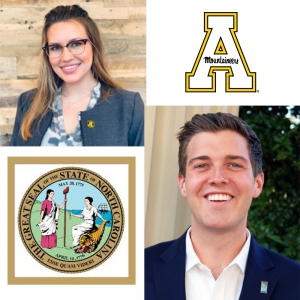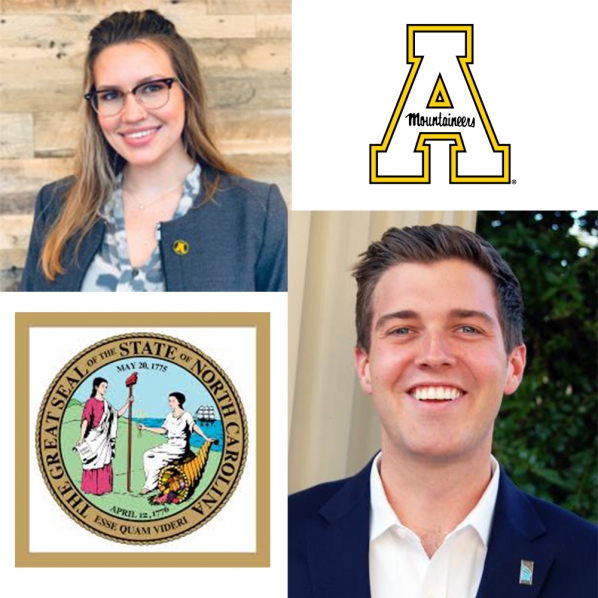Students from colleges and universities across North Carolina unexpectedly lost internships due to COVID-19. At the same time, many local government and nonprofit organizations have been overwhelmed in response to needs related to COVID-19. State government, higher education, local government and nonprofit partners collaborated to develop the N.C. COVID-19 Student Response Corps, a program that provides organizations with additional capacity and students with experience. Dylan Russell ’14 and current student Sierra Watson have directly been involved in this summer’s N.C. Student Corps opportunities.
“North Carolina’s local governments and nonprofits are on the frontlines of keeping residents safe and helping communities respond to the global pandemic. The N.C. Covid-19 Student Response Corps leverages North Carolina’s greatest asset - our students and graduates and combines them with high impact positions to address significant challenges. Young people want what government and nonprofits offer – careers in which they can make a meaningful impact,” Dylan Russell, executive director of Lead for North Carolina at the UNC School of Government said.
The N.C. COVID-19 Student Response Corps has placed over 80 interns in positions across the state with hundreds of additional organizations expressing interest in hosting an intern. Partners in this effort include the UNC School of Government/Lead for N.C., Hometown Strong, N.C. Association of County Commissioners, N.C. League of Municipalities, N.C. Rural Center and N.C. colleges and universities. A current list of opportunities can be found at: N.C. Student Corps.
“Internships benefit host organizations by evaluating new talent and learning from students’ fresh perspectives. Interns bring innovation and creativity to the public sector, especially in rural settings. Just as we reap the benefits of an organization mentoring us, employers can learn just as much from their interns,” Sierra Watson, Appalachian Master of Public Administration student said.
Russell, executive director of Lead for North Carolina at the UNC School of Government and Sierra Watson, Appalachian State University Master of Public Administration (MPA) student and current intern for Town of North Wilkesboro were invited to participate in the Governor’s June monthly connect meeting in a panel discussion on “COVID-19 Response: Government-university-student partnerships.” The Monthly Connect is a project of the Strategic Partnerships office (Office of State Budget and Management), part of Governor Cooper's administration. The Student Response Corps is also a project of the Strategic Partnerships office and you can learn more about Strategic Partnerships by visiting the Highlights archive.
The panel also included: Yolanda Carcana, interim director of Career Services, Elizabeth City State University and Martyn Johnson, director, Beaufort County Economic Development.
Panelists discussed how internships can prepare students for careers and strengthen talent pipelines for state and local government; how colleges and universities can facilitate meaningful work experiences for students; what interns need to develop useful skills and experience and how organizations can help develop students’ knowledge of and interest in public service careers. You can listen to the meeting with password: Dxj6GkPt.
“Dylan contacted us in the Career Development Center in May when the Governor’s Office was just beginning to envision what this initiative could be. We immediately said “yes” Appalachian would like to participate,” Dr. Susan McCracken, director of Career Development and Economic Engagement at Appalachian said. “Our students are very civic-minded and I knew the public service component would be appealing. The Student Response Corps met a need for students to gain valuable work skills, build their professional network and meet the needs of local communities.”
Russell is co-founder of Lead for America and helped create the first state affiliate at the UNC School of Government. Dylan was previously the donor relations/discovery officer in the School of Government’s Development Office. In graduate school, Russell was elected as the graduate and professional student body president and at Appalachian State University, he served as the student body president. Prior to joining UNC School of Government, he was a white house intern, a policy analyst at the N.C. Department of Public Instruction, a fifth-grade public school teacher in the Chapel Hill–Carrboro City Schools and a member of the Board of Trustees at Appalachian State. Russell earned a B.S. in elementary education from Appalachian in 2014 and a MPA with a public policy minor from UNC Chapel Hill.
Sierra Watson, from Taylorsville, N.C., received her undergraduate degree in business administration and marketing from the University of North Carolina at Charlotte. When completing her graduate certificate in not-for-profit management, she interned with local Boone non-profit, Wine To Water as their campaign and events coordinator.
“It is important to educate and prepare students to be public service leaders. Internships do just that – by putting our foundational knowledge to practice and giving us the experience we need to learn about the community we wish to represent,” said Watson. “Internships enable students to acquire those soft skills and interpersonal skills, which are hard to learn in the classroom. From my experience, my internships have improved my communication skills and confidence.”
###
About the Department of Government and Justice Studies
Appalachian State University’s Department of Government and Justice Studies offers undergraduate programs in political science and criminal justice, and graduate programs in political science and public administration. Housed in the College of Arts and Sciences, the department has over 600 undergraduate majors and more than 70 graduate students. Learn more at https://gjs.appstate.edu.
About the College of Arts and Sciences
The College of Arts and Sciences is home to 16 academic departments, one stand-alone academic program, two centers and one residential college. These units span the humanities and the social, mathematical and natural sciences. The College of Arts and Sciences aims to develop a distinctive identity built upon our university's strengths, traditions and unique location. The college’s values lie not only in service to the university and local community, but through inspiring, training, educating and sustaining the development of its students as global citizens. There are approximately 6,100 student majors in the college. As the college is also largely responsible for implementing Appalachian's general education curriculum, it is heavily involved in the education of all students at the university, including those pursuing majors in other colleges. Learn more at https://cas.appstate.edu.
About the Department of Curriculum and Instruction
Department of Curriculum and Instruction offers a broad range of comprehensive degree programs at the baccalaureate and master’s levels. The department seeks to provide quality programs that emphasize the integration of academics and field experiences. Learn more at https://ci.appstate.edu.
About the Reich College of Education
Appalachian offers one of the largest undergraduate teacher preparation programs in North Carolina, graduating about 500 teachers a year. The Reich College of Education enrolls approximately 2,400 students in its bachelor's, master's, education specialist and doctoral degree programs. With so many teacher education graduates working in the state, there is at least one RCOE graduate teaching in every county in North Carolina. Learn more at https://rcoe.appstate.edu.
By Ellen Gwin Burnette
BOONE, N.C.
July 17, 2020

